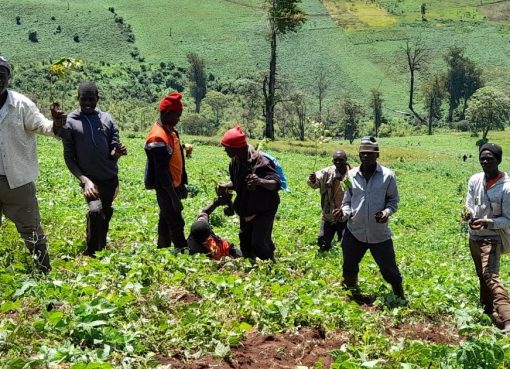The County Government of Nakuru has rolled out a campaign to promote diversification of foods as a way of mitigating the effects of climate change, boosting sources of livelihoods, and improving living standards.
The devolved unit is encouraging farmers to exploit the region’s favourable weather patterns and arable soils and increase their sources of income through crop diversification as a robust risk management strategy to increase production and food security.
County Executive Committee Member (CECM) in Charge of Agriculture, Livestock, Fisheries, and Cooperatives, Mr. Leonard Bor, observed that Kenya’s agricultural production is dominated by a narrow range of commodities, which include maize and wheat, as well as cash crops like tea, coffee, and flowers.
He added that their cultivation contributes to the livelihoods of 70 per cent of rural families, causing a concerning overreliance on just a few crops.
Speaking during a farmer’s field day jointly organised by the county government and the Kenya Dairy Board (KDB) at Kipkonyo Secondary School within Maiella Ward in Naivasha Sub County, Mr. Bor observed that climate change continues to hinder efforts to increase agricultural productivity and food and nutrition security in many developing countries.
The CECM further noted that crop diversification was one of the cheapest ways of dealing with several crop diseases, including the fall army worms in the region.
“By planting maize on the same piece of land, the chances of completely dealing with the problem of destructive pests like the Fall Army Worms are slim. This is because a farmer who plants maize in both short and long rain seasons inadvertently provides enough food for the worms,” explained Mr. Bor.
Besides going for the best maize seed varieties suitable for the soils in the area, the farmers present were encouraged to invest in early-maturing crops during the short rain seasons.
Mr. Bor identified sunflowers, Irish potatoes, sorghum, millet, carrots, groundnuts, African leafy vegetables, and soya beans as some of the best early-maturing crops, with most of them classified as drought-resistant besides their nutritional value.
He stated that diversifying production towards non-traditional varieties could help improve agricultural productivity, stabilise output, enhance food security, and mitigate the risk of climate change.
“Diversification not only expands the number of potential crop types for markets but also contributes significantly to household nutrition needs. And while it is neither a one-size-fits-all strategy nor a substitute for specialisation, especially where specific crops are thriving with a market portfolio to match, diversification is the most robust option towards creating resilient agricultural systems that can contribute significantly to household and, subsequently, national food security,” said Mr. Bor.
The CECM indicated that although maize is the country’s biggest and most important crop, by trying different well-suited crops in different regions, farmers in all 11 sub-counties will be able to address their nutritional needs more adequately and cope better with production and marketing fluctuations.
He noted that the national government highlights policy items touching on diversification and value addition in its Vision 2030 economic blueprint, including catalysing enhanced agricultural productivity, food security, and income growth.
The CEC further noted that smallholder farmers are the understated drivers of crop diversification, demanding more productive, resilient, and family-friendly crops when they realise a decreased benefit from staple crops.
Mr. Bor said that there was a need to expand what the devolved unit produces to encourage greater diversification and affordability in diets.
He said other advantages of crop diversification were the facilitation of several employment alternatives for farmers as well as foreign earnings through exportation.
Farming in most parts of Nakuru is mainly rain-fed, which sometimes causes frustration, mainly during the dry season when crops fail.
The county executive said if farmers take up high-value crops and those that can withstand drought, then they will be food secure and still have more to sell for their livelihoods.
By Anne Mwale





